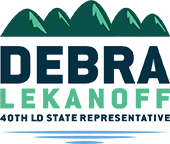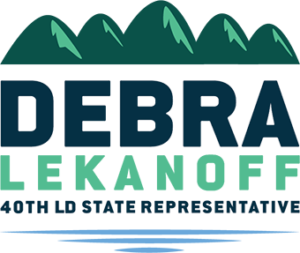Honoring Our Home on Fantastic Friday
Dear Friends,
What an amazing week I’ve had in my hometown of Yakutat, Alaska! My heart is overflowing with the abundance of salmon, berries, rushing rivers, my family, and the community that has shaped me. Let me take you on a journey to where my heart has been for the past week—welcome to my home, the place that raised your Representative to fight for the 40th District with unwavering passion for each and every one of you. This is the land of my namesake, where my bloodlines run deep, and where the roots of my identity are firmly planted.
Yakutat, known in Tlingit as Yaakwdáat, or “The Place Where Canoes Rest,” is more than just a geographical location—it’s the soul of who I am. This remote town, nestled between the towering coastal mountains and the vast Gulf of Alaska, is where the natural world and cultural heritage come together in perfect harmony. The Tlingit people have called this place home for centuries, passing down stories, traditions, and values that are intertwined with the land, the sea, and the sky. These values are not mere abstractions; they are lived every day, shaping the character and strength of our community.

In Yakutat, life flows with the rhythms of the tides and the seasons. The rivers, teeming with salmon, are the lifeblood of our community. For us, salmon is not just a resource—it’s a sacred connection to the earth and the waters that sustain us. The salmon’s journey from the ocean to the rivers to spawn is a powerful symbol of resilience, determination, and the cycle of life that we are all a part of. It is this connection to the salmon that has instilled in me the deep commitment to fight for their preservation, to ensure that these sacred fish continue to sustain our people and our culture for generations to come.
The land here is rugged and breathtakingly beautiful, with glaciers that carve through the mountains and fjords that stretch out to the open sea. This land is not just a backdrop; it is an integral part of who we are. The berries that we gather in the summer, the fish we catch, the game we hunt—all of these are gifts from the land that we cherish and protect. Living in Yakutat has taught me the importance of stewardship—of taking care of the land, the waters, and the resources that have been entrusted to us. It is a lesson that guides me every day as I work to represent the people of the 40th District, advocating for the protection of our natural resources and the communities that depend on them.

But it’s not just the natural beauty of Yakutat that shapes us; it’s the strength of our community. In a place as remote as this, community is everything. We come together to support one another, to celebrate our traditions, and to pass on the knowledge and values that have been handed down through generations.
The Tlingit culture, with its deep respect for the interconnectedness of all things, teaches us that we are all part of something larger than ourselves. It is this sense of community, of shared responsibility and mutual respect, that has given me the strength to fight for the people I represent. Whether it’s advocating for better healthcare, protecting our environment, or ensuring that everyone has a voice, the values I’ve learned in Yakutat are at the heart of everything I do.

As I return to my work in the 40th District, I carry with me the spirit of Yakutat—the love for this land, the respect for our culture, and the strength of our community. These are the values that guide me, that give me the passion to fight for each and every one of you. I am proud to be your Representative, and I am proud to come from Yakutat, the place that raised me, the place that continues to inspire me every day.
Keep reading for more on this Fantastic Friday.
Rep. Debra Lekanoff
Historic Investment to Conserve Biodiversity
The Washington State Legislature has made a historic $23 million investment in biodiversity conservation through the Washington Department of Fish and Wildlife (WDFW). This significant funding allocation marks a major step forward in protecting the state’s most vulnerable species and habitats.
For the 2024 fiscal year, the legislature has allocated $8 million, with an additional $15 million earmarked for 2025. Notably, this $15 million will become a permanent annual allocation in subsequent years, providing WDFW with the stability needed to implement long-term conservation strategies.

Traditionally, a large portion of WDFW’s operational funds has come from taxes on hunting and fishing gear, primarily directed towards managing species that are hunted and fished. However, this new investment breaks ground by focusing substantial resources on the conservation of non-game species and the broader ecosystems that support them. The funding will support habitat protection, species restoration, essential research, and public education and outreach.

This investment significantly enhances the state’s capacity to address the mounting challenges posed by climate change and the increasing pressures from development on our natural heritage. By ensuring ongoing support for biodiversity conservation, Washington is taking a proactive stance in preserving the delicate balance of its ecosystems for future generations.
In addition to the direct funding, the budget proviso includes a directive for the Ruckelshaus Center to conduct a comprehensive review of WDFW and the Fish and Wildlife Commission. This review will assess their ability to fulfill their roles as trustees of fish and wildlife on behalf of the public and will examine their current statutory mission. While this aspect was not the primary focus of the coalition’s advocacy, it presents an important opportunity for reflection and potential improvement in how we manage and protect our state’s natural resources.

This $23 million investment is not just a financial commitment; it represents a pledge to the future of Washington’s natural beauty and ecological diversity. As we move forward, this funding will be crucial in ensuring that the state remains a leader in conservation, addressing the urgent needs of our environment with the dedication and resources required to make a lasting impact.
Protecting the San Juan Islands for Generations to Come
As we approach the 2025 legislative session, my focus is on developing policies, regulations, and fiscal investments to protect vital ecosystems like the San Juan Islands. These islands are not only a natural treasure but also a crucial part of our ecosystem, attracting millions of visitors annually. This high visitation puts significant pressure on the islands’ environment, resources, and infrastructure.
As the representative for the 40th District, I am committed to raising awareness about the importance of preserving these integral parts of our Pacific Northwest biome. We must implement proactive measures to maintain the pristine nature of these areas before they are degraded by unchecked growth and insufficient governmental services.

Our aim is to protect the San Juan Islands and similar environments preemptively, ensuring the preservation of natural resources and ecosystems for future generations. By acting now, we can create a legacy of stewardship that honors these precious places and their role in sustaining our region’s health and vitality.
This effort requires substantial investment in our state’s environmental infrastructure, particularly the Washington Department of Fish and Wildlife (WDFW). Biodiversity is fundamental to a healthy ecosystem, and the WDFW leads efforts to preserve it across Washington. By securing funding for the WDFW, we can support critical initiatives like habitat restoration, species conservation, and natural resource management.
The San Juan Islands exemplify what’s at stake, hosting unique species like the Southern Resident Killer Whales (SRKWs) and the rare Island Marble Butterfly. The SRKW population has fluctuated since the 1970s, with recent counts showing concerning low numbers. The Island Marble Butterfly, once thought extinct, was rediscovered in the San Juan Islands, highlighting the importance of habitat preservation.
Through strategic investments and partnerships with organizations like the WDFW, we can lead in creating a sustainable future that balances population growth with environmental protection. Our commitment to biodiversity will shape the quality of life for future generations, ensuring a thriving, resilient environment for years to come.
Washington’s Wildfire Crisis
Washington State is facing another severe wildfire season, with the Swawilla Fire on the Colville Reservation causing significant disruption and damage. The fire, along with the nearby Bridge Creek Fire, has burned over 51,000 acres and is only partially contained despite extensive firefighting efforts.
The Swawilla Fire has prompted Level 3 evacuations for several communities and required increased air support, including Very Large Air Tankers, helicopters, and scooper aircraft. After two weeks of burning, the fire is 60% contained with 616 personnel working on containment lines and preparing for controlled burns to protect the town of Keller.

Courtesy of King 5
In response to the growing wildfire threat, Washington’s legislature has taken steps to enhance the state’s wildfire response capabilities. House Bill 1578, the “Cascading Impacts of Wildfire” bill, aims to expand the “Wildfire Ready Neighbors” program to Western Washington and address post-wildfire risks.
The 2024 legislative session continued funding for forest health and wildfire resilience through the Washington State Department of Natural Resources (DNR). House Bill 1168, passed in 2021, allocated $23.41 million from the General Fund-State to support forest health initiatives.

Courtesy of the Seattle Times
Commissioner of Public Lands Hilary Franz has emphasized the DNR’s preparedness, with firefighters able to reach new fire starts within 15 to 30 minutes. However, challenging terrains like those in the Pioneer Fire in Chelan County highlight the limitations of even well-prepared response efforts.
As Washington faces record-breaking heat and potential thunderstorms, the importance of proactive legislative measures and continued investment in wildfire prevention, response, and recovery efforts is clear. The ongoing crisis on the Colville Reservation serves as a reminder of the need for sustained action to protect forests, wildlife, and communities from the growing wildfire threat.
Modernizing the Port of Bellingham
The Port of Bellingham is undertaking a significant $27.5 million modernization project for its Shipping Terminal, set to be completed over the next two years. This initiative aims to enhance the port’s capabilities, create jobs, and improve environmental standards.

Key aspects of the project include:
-
Increasing navigation depth from -26 feet to -35 feet, allowing larger vessels to access the terminal.
-
Removing 22,000 cubic yards of contaminated sediment to improve water quality.
-
Replacing 140 feet of damaged dock to reinforce the terminal’s infrastructure.
-
Installing a new stormwater management system to reduce environmental impact.
-
Creating long-term, family-wage jobs in the maritime sector.
The project has received substantial federal support, including a $6.85 million grant from the U.S. Department of Transportation’s Port Infrastructure Development Program and a $17.9 million grant from the Rebuilding American Infrastructure with Sustainability and Equity (RAISE) program.
Rep. Rick Larsen (WA-02) has been instrumental in securing this federal funding, emphasizing the project’s potential to create jobs, reduce carbon emissions, and strengthen supply chains.
The modernization effort is expected to transform the terminal into a fully functioning multimodal facility, improving efficiency in loading and unloading railcars. It aligns with broader goals of sustainable economic development and environmental stewardship in Washington’s 40th Legislative District.

This project demonstrates the power of collaboration between tribal, local, state, and federal governments in driving infrastructure improvements and economic growth. As the 2025 legislative session approaches, continued advocacy for policies, regulations, and funding to support such initiatives will be crucial for the region’s development.
For more information on the project and its ongoing developments, you can visit the [Port of Bellingham website](https://www.portofbellingham.com)
Celebrating Joe Gaydos!
I am thrilled to announce an exceptional opportunity for our 40th District as we honor Joe Gaydos, a leading figure in the scientific community and a steadfast advocate for the health of the Salish Sea. Joe’s deep commitment to environmental stewardship and collaboration has made a significant impact not only in our legislative district but throughout the entire Pacific Northwest.

As a member of the esteemed SeaDoc Society and the Washington State Academy of Sciences, Joe embodies the spirit of partnership that drives effective science-based solutions. His role in facilitating communication and cooperation among over 400 scientists showcases his dedication to ensuring that our region’s ecological integrity is upheld for generations to come. This collaboration is vital as we navigate the complex challenges facing our marine ecosystems.
Joe’s extensive network of relationships with Pacific Northwest tribal scientists and leaders reflects his commitment to inclusivity and respect for Indigenous knowledge in scientific discourse. By bringing diverse voices to the table, Joe not only enhances our understanding of the Salish Sea but also underscores the importance of collaboration across disciplines and communities.

We are incredibly fortunate to have Joe steering these meaningful conversations, representing the 40th Legislative District at critical scientific forums, and championing the well-being of our natural resources. His passion for science and community engagement inspires us all to be more involved in protecting the beauty and sustainability of our environment.



